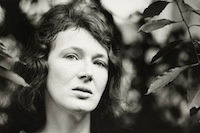Sub-Rosa is a reading group that meets once a month to discuss feminist and obscure literature.
Our selection for this month is Nightwood by Djuna Barnes.
We will meet Saturday, December 7 at 6:30 p.m. at the store. A reminder will be sent out the day before the meeting.
If you are interested in attending please send us your email to bookbeatorders@gmail.com.
Books are in stock and discounted 15%.
Nightwood, Djuna Barnes’ strange and sinuous tour de force, “belongs to that small class of books that somehow reflect a time or an epoch” (Times Literary Supplement). That time is the period between the two World Wars, and Barnes’ novel unfolds in the decadent shadows of Europe’s great cities, Paris, Berlin, and Vienna—a world in which the boundaries of class, religion, and sexuality are bold but surprisingly porous.
The outsized characters who inhabit this world are some of the most memorable in all of fiction—there is Guido Volkbein, the Wandering Jew and son of a self-proclaimed baron; Robin Vote, the American expatriate who marries him and then engages in a series of affairs, first with Nora Flood and then with Jenny Petherbridge, driving all of her lovers to distraction with her passion for wandering alone in the night; and there is Dr. Matthew-Mighty-Grain-of-Salt-Dante-O’Connor, a transvestite and ostensible gynecologist, whose digressive speeches brim with fury, keen insights, and surprising allusions. Barnes’ depiction of these characters and their relationships (Nora says, “A man is another persona woman is yourself, caught as you turn in panic; on her mouth you kiss your own”) has made the novel a landmark of feminist and lesbian literature.
Most striking of all is Barnes’ unparalleled stylistic innovation, which led T. S. Eliot to proclaim the book “so good a novel that only sensibilities trained on poetry can wholly appreciate it.” Now with a new preface by Jeanette Winterson, Nightwood still crackles with the same electric charge it had on its first publication in 1936.
“What I would leave the reader prepared to find is the great achievement of of a style, the beauty of phrasing, the brilliant of wit and characterization and a quality of horror and doom very nearly related to that of Elizabethan tragedy.”—T. S. Eliot
“One of the greatest books of the twentieth century.”—William S. Burroughs
“Nightwood is itself. It is its own created world, exotic and strange, and reading it is like drinking wine with a pearl dissolving in the glass. You have taken in more than you know, and it will go on doing its work. From now on a part of your is pearl-lined.”—Jeanette Winterson
 Angela Carter (1940-1992) wrote nine novels and numerous short stories, as well as nonfiction, radio plays, and the screenplay for Neil Jordan’s 1984 movie The Company of Wolves, based on her story of the same name.
Angela Carter (1940-1992) wrote nine novels and numerous short stories, as well as nonfiction, radio plays, and the screenplay for Neil Jordan’s 1984 movie The Company of Wolves, based on her story of the same name.
She won numerous literary awards, traveled and taught widely in the United States, and lived in London
